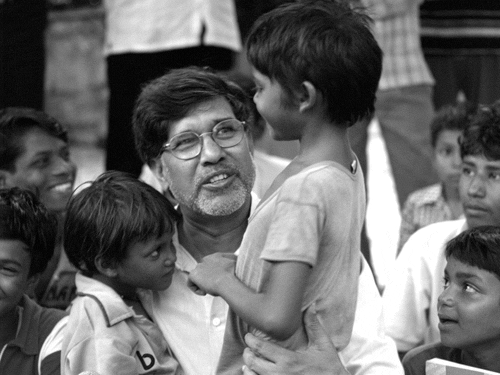Nobel Peace Prize goes to an Indian and a Pakistani
 0 Comment(s)
0 Comment(s) Print
Print E-mail China.org.cn, October 10, 2014
E-mail China.org.cn, October 10, 2014
Kailash Satyarthi and Malala Yousafzay are awarded the 2014 Nobel Peace Prize for their struggle against the suppression of children and young people and for the right of all children to education, the Norwegian Nobel Committee announced on Friday.
|
|
|
Kailash Satyarthi with children [http://www.kailashsatyarthi.net/] |
Born in January 1954, Kailash Satyarthi is an Indian children's rights activist. He has been active in the Indian movement against child labour since the 1990s. So far his organization, Bachpan Bachao Andolan, has freed over 80,000 children from various forms of servitude and helped in successful re-integration, rehabilitation and education.
According to a press release posted at the official website of the Nobel Committee, Kailash Satyarthi, maintaining Gandhi’s tradition, has headed various forms of protests and demonstrations, all peaceful, focusing on the grave exploitation of children for financial gain. He has also contributed to the development of important international conventions on children’s rights.
Malala Yousafzay, born in July 1997, is a Pakistani school pupil, education activist from the town of Mingora in the Swat District of Pakistan's northwestern Khyber Pakhtunkhwa province. She is known for her activism for rights to education and for women, especially in the Swat Valley, where the local Taliban had at times banned girls from attending school. In early 2009, at the age of 11–12, Yousafzai wrote a blog under a pseudonym for the BBC detailing her life under Taliban occupation and her views on promoting education for girls in the Swat Valley. In 2010, a The New York Times documentary by journalist Adam B. Ellick was filmed about her life. Yousafzai rose in prominence, giving interviews in print and on television, and she was nominated for the International Children's Peace Prize by South African activist Desmond Tutu.
|
|
|
Yousafzai at Girl Summit 2014 |
The Nobel Committee praises her great personal courage, saying her efforts have shown that children and young people, too, can contribute to improving their own situations. Through her heroic struggle she has become a leading spokesperson for girls’ rights to education.
The Nobel Committee regards it as an important point for a Hindu and a Muslim, an Indian and a Pakistani, to join in a common struggle for education and against extremism. The struggle against suppression and for the rights of children and adolescents contributes to the realization of the "fraternity between nations" that Alfred Nobel mentions in his will as one of the criteria for the Nobel Peace Prize.
Statistics show that there are 168 million child labourers around the world today. The Nobel Committee said that it is a prerequisite for peaceful global development that the rights of children and young people be respected. In conflict-ridden areas in particular, the violation of children leads to the continuation of violence from generation to generation.








Go to Forum >>0 Comment(s)